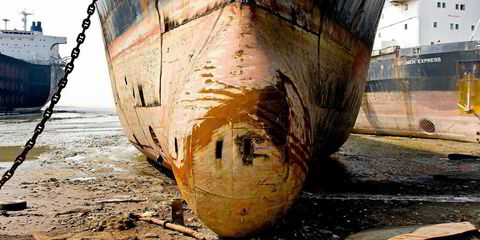An expedition by investigators and scientists has found the voyage data recorder (VDR) of TOTE Maritime's sunken ro-ro El Faro, the National Transportation Safety Board (NTSB) said Tuesday.
The discovery could prove a breakthrough for the investigation into the ship's October loss off Crooked Island, Bahamas.
There were no survivors among the 33 men and women onboard the 5,330-lane-metre El Faro (built 1975) when it sank during Hurricane Joaquin, and communication with the ship was lost just 17 minutes after the first report of trouble.
It is hoped the VDR will provide data that will help identify factors that contributed to the casualty, in addition to voice recording on the bridge in its final hours.
"We can do it without the VDR, but with no eyewitnesses, its more difficult, certainly," said US Coast Guard Capt Jason Neubauer, chairman of the Marine Board of Investigation on the El Faro casualty. "We know that it will likely fill some of the gaps that we are dealing with at this time."
He told TradeWinds today that he hopes that the VDR is in a condition that will allow the data to be recovered.
Deep down
The device was found using remotely operated undersea search equipment operated from the US Navy research vessel Atlantis in 4,600-metre-deep water some 66 kilometres northeast of Crooked Island.
"Finding an object about the size of a basketball almost three miles under the surface of the sea is a remarkable achievement," said NTSB Chairman Christopher Hart. "It would not have been possible without the information gained during the first survey of the wreckage and the equipment and support."
The NTSB, Coast Guard and Woods Hole Oceanographic Institution and TOTE teamed up in the search.
The teams will now have to determine how best to retrieve the VDR. The Atlantis will remain on site though 30 April to carry out additional photo and video documentation of the El Faro wreck and debris field.




